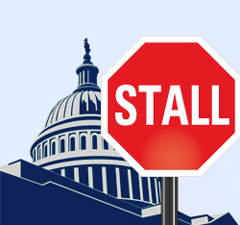
On Tuesday, November 17, 2009, 29 Senators attempted to filibuster a nomination and failed.
29 Republicans tried to stall a nomination they didn't like.
What does this mean?
It takes 51 votes to pass a bill in the Senate. But it takes 60 votes to end debate. These days it's quite common for the minority party to threaten to filibuster (to debate indefinitely) in order to prevent action on a measure.
A cloture vote is the Senate's way of asking "Can we move on, please?" It needs 60 votes to pass. There are 100 senators. As a result, as few as 41 senators can, as a bloc, bring the U.S. Senate to a standstill.
Why this bill?
Good question. Read more about this nomination and decide for yourself if it was worth holding up the business of the U.S. Senate.
Why Republicans?
In the 111th Congress, Republicans tend to vote against cloture because they're in the minority. Historically, the party that is outnumbered wields the filibuster — but they've done so more and more often in recent years.
Scoreboard
This was the 32nd cloture vote of the 111th Congress.
So far there have been 90 cloture votes out of 696 roll call votes — a percentage of 12.93%.
The 110th Congress (2007–2008) set a crazy record: 112 cloture votes out of 657 roll call votes. That's a percentage of 17.0%! When it comes to legislative inaction, we've got some big shoes to fill.
Who voted against cloture?
Is one of your senators in this list? Get in touch and ask what's up.
AL
Jeff Sessions, Richard Shelby
AZ
Jon Kyl, John McCain
FL
George LeMieux
GA
Johnny Isakson
ID
Mike Crapo, Jim Risch
IA
Chuck Grassley
KS
Sam Brownback, Pat Roberts
KY
Jim Bunning, Mitch McConnell
LA
David Vitter
MS
Thad Cochran, Roger Wicker
MO
Kit Bond
NE
Mike Johanns
NV
John Ensign
NC
Richard Burr
OH
George Voinovich
OK
Tom Coburn, Jim Inhofe
SC
Jim DeMint, Lindsey Graham
TN
Bob Corker
UT
Bob Bennett
WY
John Barrasso, Mike Enzi
